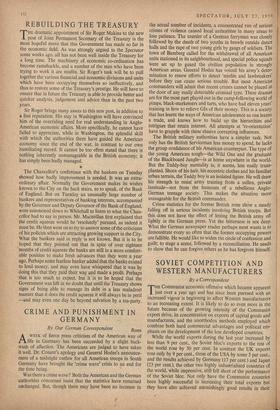CRIME AND PUNISHMENT IN GERMANY
AWEEK of fierce press criticism of the American way of life in Germany has been succeeded by a slight back- wash of affection. The Americans are judged to have taken it well. Dr. Conant's apology and General Hodes's announce- ment of a midnight curfew for all American troops in South Germany have brought the 'crime wave' crisis to an end for the time being.
Was there a crime wave? Both the American and the German authorities concerned insist that the statistics have remained unchanged. But, though there may have been no increase in the actual number of incidents, a concentrated run of serious crimes of violence caused local authorities in many areas to lose patience. The murder of a German ferryman was closely followed by the death of two youths in brawls outside dance halls and the rape of two young girls by gangs of soldiers. The town of Bamberg called for the withdrawal of all American units stationed in its neighbourhood, and special police squads were set up to guard the civilian population in strongly American areas. General Hodes has voiced his army's deter- mination to renew efforts to detect 'misfits and lawbreakers' before they can cause serious trouble. But most American commanders will admit that recent crimes cannot be placed at the door of any easily detectable criminal type. These dramas are for the most part played out in the camp-following world of pimps, black-marketeers and tarts, who have had eleven years' training in how to relieve GIs of their money. This is a society that has learnt the ways of American adolescence as one learns a trade, and knows how to build up the hierarchies and intrigues that retain interest. All attempts at 're-orientation' have to grapple with these elusive corrupting influences.
The British military authorities have a simpler task. Not only has the British Serviceman less money to spend, he lacks the group confidence of his American counterpart. The type of the young American tough—the Wild One and the graduate of the Blackboard Jungle—is at home anywhere in the world. But the Teddy-boy mentality is, it seems, less easily trans- planted. Shorn of his hair, his eccentric clothes and his familiar urban terrain, the Teddy boy is an isolated figure. He will draw his strength to resist army training from a sullen, private lassitude—not from the humours of a rebellious Anglo- German teenage society. This makes the situation more manageable for the British commander.
Crime statistics for the former British zone show a steady falling off in serious incidents involving British troops. But this does not have the effect of letting the British army oft lightly in the German press. Yet the bitterness is not deep. What the German newspaper reader perhaps most wants is to demonstrate every so often that the former occupying powers are fallible. He would like to widen the circle of confession and guilt; to stage a scene, followed by a reconciliation. He needs to show that he can forgive, others as he has forgiven himself.


































 Previous page
Previous page